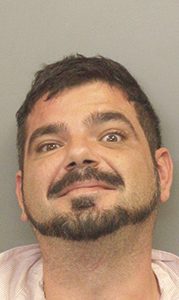Man pleads guilty to swindle
Published 9:59 pm Tuesday, June 27, 2017
A former Suffolk man who swindled a Suffolk woman out of about $377,000 faces up to 30 years in prison when he is sentenced for the fraud in October.
Harry Randall Withers Jr. pleaded guilty Tuesday in U.S. District Court in Norfolk to one count of wire fraud and one count of engaging in a monetary transaction in criminally derived property. He had been charged with five counts of each.
For nearly two years from December 2012 to August 2014, Withers constructed a web of lies to encourage a Suffolk woman to hand over large amounts of cash, according to the federal indictment.
The woman is identified in the federal indictment only as R.B., but prior court documents in Suffolk have named her as Ruth Baker, the owner of a Bank Street mansion that she is in the process of turning into a bed-and-breakfast.
According to the indictment, Withers made a number of false representations to Baker in order to get her to lend him money. Among them was the claim that he had “euthanized” his mother with a lethal dose of morphine to end her suffering from a serious illness, according to the indictment. He said he needed money to prevent an autopsy being performed, because family members were suspicious of the cause of death. But his mother was actually not dead or ill at all.
Withers also told Baker he was the co-owner of C3 Vino, a wine and cheese shop in downtown Suffolk. In fact, he was only the manager.
He told her the co-owner and employees of the business had embezzled money from him, when in fact he was embezzling money from the actual owner of the business, according to the court documents. He said he needed money from Baker to keep the business afloat, when in fact he wanted money for his own personal benefit.
He claimed he was from an affluent family that had founded Union Camp Corp., the company later acquired by International Paper. In fact, he was not a member of that family, according to the indictment.
Withers also claimed his grandmother died and left him with a large inheritance that he could use to repay Baker, according to the indictment. In fact, his grandmother was alive.
Withers told Baker the Internal Revenue Service had frozen his bank accounts, which was also untrue, according to the indictment.
Withers gave Baker six checks totaling $70,800, purportedly as partial payment of the money that had been lent him. However, the checks were written on accounts that had insufficient funds or were closed.
Withers eventually told Baker it would be easier for her to get her money back if they were married, and the two got married in Norfolk. The marriage was later annulled after it became clear Withers had no intention of repaying the money, according to the indictment.
Baker moved from Maine to Suffolk in September 2012, having recently been widowed from her first husband. She was the winner of an auction earlier that month for a Bank Street mansion that she hoped to turn into a bed and breakfast.
She met Withers soon thereafter, and he began lying to her almost immediately, according to court documents. By mid-2014, she had exhausted almost all of the liquidity from her husband’s estate, according to the court documents, and she began pressing Withers for repayment.
When she needed to travel to Florida for her daughter’s medical issues but didn’t have the money, Withers suggested she get a car title loan and that he would pay the loan as partial repayment, according to the annulment paperwork. He never did, and her vehicle was repossessed and sold.
When Baker returned to Suffolk in August 2014, she found her house in shambles, her vehicle repossessed, and her checking account overdrawn because he had deposited bad checks and then had written checks on them, according to the annulment documents. That was when the ruse ended.
Around the same time, C3 Vino was closed down by the landlord for a default on its lease, according to a sign on the business then.
Withers’ sentencing is set for Oct. 13. In addition to incarceration, he can be ordered to pay restitution of the full amount.







